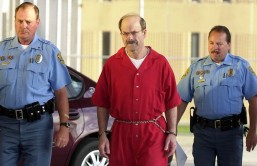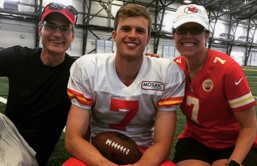Despite its continued success from revenues, television ratings and a committed fan base, the NFL is in a quandary. Is the league expected to focus exclusively on producing great football entertainment? Should the NFL be a leader for social change? Or is it a combination of both?
Former New York Giants receiver Amani Toomer understands the conflict some fans might be feeling. But he thinks people might be asking too much of the league.
"I find it hard to believe that people want everything from the NFL," Toomer told HNGN. "What the NFL does best is put on broadcasts, put on football games, entertain and get people engaged in football as much as possible. Now if you try to ask the NFL to raise your kids and be the moral police of the country, I think you're asking a little too much."
Toomer played with the Giants from 1996-2008, and finished his career with 668 receptions for 9,497 yards and 54 touchdowns. His experience gave him first-hand knowledge about many of the questions facing the NFL today.
"It's definitely alarming," Toomer said of the handful of recent domestic violence incidents. "But I don't think it is a real problem in the NFL. I think it's more a lot of things coming together at the same time...I don't think it's a problem in the NFL, I think it's a problem in our society that the NFL has helped bring out to the forefront."
The rate of domestic violence arrests among NFL players is lower than the national average of all men ages 25 to 29. However, domestic violence seems to be the most common offense among NFL players.
Domestic violence arrest rates among NFL players "are quite low compared to national averages for men in their age range," with a total of roughly 250 per 100,000 arrests every year compared to the national figure that is closer to 500, according to Benjamin Morris of FiveThirtyEight.com. The troubling trend Morris picked up on though is that the 83 domestic violence arrests among NFL players account for 55.4 percent of the league's total arrests.
"Although this is still lower than the national average, it's extremely high relative to expectations," Morris wrote. "That 55.4 percent is more than four times worse than the league's arrest rate for all offenses (13 percent), and domestic violence accounts for 48 percent of arrests for violent crimes among NFL players, compared to our estimated 21 percent nationally."
Yes, Toomer is correct in the fact that, on average, NFL players are committing this crime less than other comparable demographics by a wide margin. But for some reason, when a player in the league does commit a crime, chances are, it's domestic violence.
Toomer is a Super Bowl champion who saw a lot during his time in the NFL. But domestic violence wasn't an issue that ever came up.
"I played in the league for 13 years and I never heard of any domestic violence case on a team I played for. It's a rarity, it's not an everyday occurrence and I think that it's definitely being blown out of proportion."
Toomer notes that a lot of players currently in the NFL endured rough childhoods. Diverse backgrounds and upbringings are bound to affect decision making, he argues. And the NFL may not be adequately equipped to help with that.
"When a lot of people coming from different areas of the country come together to play in one league, you're going to get these types of things," Toomer said. "A lot of the people that play in the NFL and sacrifice their lives and put their lives on the line to play football, in some cases, come from the worst places in our country. You can't think, just because you give somebody money and fame, that all of a sudden they are going to be a new person. They've lived 20 to 23 years of their lives outside of the NFL. You can't just throw money at somebody and make all their problems, mental problems and scars from childhood go away."
Football is a game based on physicality. You are taught to inflict damage on your opponent. Toomer acknowledges that football is "a violent sport." But he doesn't believe the nature of the game causes athletes to be more likely to be violent off of the field. Does being a dentist automatically guarantee you were born with perfect teeth? He argues that the environment you grew up in has a larger impact on your personality than your profession. Each individual is responsible for his or her choices.
He's not making excuses for these players. But he is highlighting an important issue that goes unnoticed. Perhaps the NFL's focus shouldn't be reactionary punishment. Instead, maybe an emphasis should be placed on educating athletes about domestic violence and helping them get acclimated to life as a professional athlete in the spotlight. A more proactive approach could yield better results than just waiting to penalize the next offender.
Toomer understands that the nature of following football has changed drastically in recent years. There are more news outlets and enhanced coverage across the country. Fans are more engaged, and anyone with a Twitter account or a camera phone can now break a story. At any moment of the day, you can find a public forum for a sports conversation on the Internet, television or radio. The level of privacy granted to athletes is shrinking every day. As a result, players must be more cognizant of their actions. The world is too open and connected to pretend inappropriate behavior and poor decisions will go unnoticed.
"Because the NFL is more popular now with social media and all the different cameras everywhere, I think players are starting to feel the brunt and they have to realize they're in a different situation than in the past," Toomer said.
As the public scrutiny facing the league continues, it's clear fans are hoping to get the best of both worlds. They still want to watch football and support their teams, but they don't want to feel guilty for doing so. It is a simultaneous demand for violent entertainment on the field and high mindedness off of it.
There is no place for domestic violence in any facet of life. That much is obvious. But is it fair for fans to expect the NFL to intervene in every athlete's life?
"I would let the judicial system take its course. I would say 'We're not going to penalize anybody, we're not investigators, we're not the FBI," Toomer said when asked what one change he would like to see in the NFL. "We're going to let the court system do what it has to do and if you're a free person and are under investigation that's fine unless you're convicted guilty.'"
"If you're convicted guilty that's when, I think, the hammer should come down. That's when we all know you've been judged by your peers and you're guilty, not just because of some video coming out or he said and she said stuff. There are a lot of steps that are taken to protect our rights as Americans that should be looked upon. You're innocent until proven guilty and I think that the NFL should do that."








